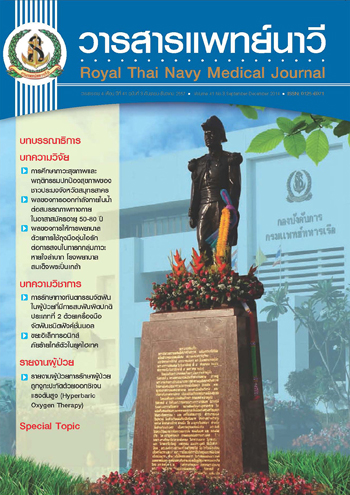ผลของการให้การพยาบาลด้วยการใช้ถุงมืออุ่นไอรักต่อการสงบของทารกกลุ่มภาวะหายใจลำบาก โรงพยาบาลสมเด็จพระปิ่นเกล้า
Main Article Content
บทคัดย่อ
การวิจัยนี้เป็นการวิจัยเชิงทดลองแบบกลุ่มเดียวที่มีการเปรียบเทียบทั้งกลุ่มทดลองและกลุ่ม
ควบคุม มีวัตถุประสงค์เพื่อเปรียบเทียบการสงบของทารกกลุ่มภาวะหายใจลำบากที่ใช้วิธีการดูแลแบบ
ปกติกับการดูแลโดยใช้ถุงมืออุ่นไอรัก จำแนกตามอัตราการเต้นของหัวใจ ระดับออกซิเจนในร่างกาย
และระยะเวลาการนอนหลับของทารก กลุ่มตัวอย่างเป็นทารกแรกเกิดที่มีภาวะหายใจเร็วหลังคลอด
และแพทย์วินิจฉัยเป็นโรคกลุ่มภาวะหายใจลำบากจำนวน 40 คน ใช้วิธีการเลือกแบบเฉพาะเจาะจง
กลุ่มควบคุมจะได้รับการพยาบาลตามปกติ ส่วนกลุ่มทดลองจะได้รับการพยาบาลตามปกติร่วมกับถุงมือ
อุ่นไอรัก เครื่องมือที่ใช้ในการวิจัยประกอบด้วย ถุงมืออุ่นไอรัก แบบบันทึกข้อมูลส่วนบุคคลของทารก
แบบบันทึกอัตราการเต้นของหัวใจ ระดับออกซิเจนในร่างกาย และระยะเวลาการนอนหลับของทารก
สถิติที่ใช้ในการวิเคราะห์ข้อมูล ได้แก่ ร้อยละ ค่าเฉลี่ย ส่วนเบี่ยงเบนมาตรฐาน และทดสอบความ
แตกต่างของค่าเฉลี่ยสองกลุ่ม โดยการทดสอบค่าทีผลการวิจัยพบว่า การให้การพยาบาลโดยใช้ถุงมือ
อุ่นไอรักมีผลทำให้ทารกป่วยมีอัตราการเต้นของหัวใจลดลงและระยะเวลาการนอนหลับมากกว่าการให้
การพยาบาลทารกด้วยวิธีปกติอย่างมีนัยสำคัญทางสถิติ (t = 0.02, 0.00 ตามลำดับ) และทำให้ระดับ
ออกซิเจนในร่างกายเพิ่มขึ้นอย่างไม่มีนัยสำคัญทางสถิติ (t = 0.13)


